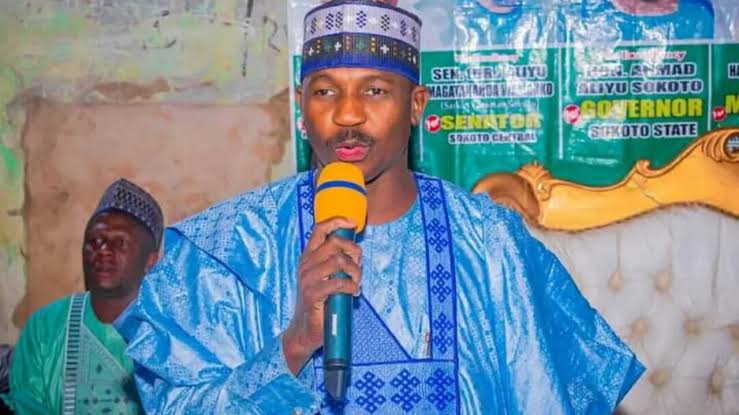On the eve of the 2025 Sallah celebrations, Sokoto State Governor, Ahmed Aliyu, announced a significant financial gesture by disbursing N450,000 to each of the 3,200 pilgrims from the state as a Sallah gift. This initiative, aimed at supporting pilgrims preparing for the Hajj or participating in local festivities, underscores the state government’s commitment to easing the financial burdens of its citizens during this sacred period. The total disbursement amounts to N1.44 billion, a substantial investment in promoting religious observance and community welfare.
The announcement was made during a ceremony at the Government House in Sokoto, attended by state officials, religious leaders and representatives of the pilgrims. Governor Aliyu emphasized that the gesture reflects the administration’s dedication to supporting Islamic practices and ensuring that pilgrims can focus on their spiritual obligations without financial strain. The funds are intended to cover expenses such as transportation, accommodation, and other necessities associated with the Hajj pilgrimage or local Sallah celebrations.
The selection of the 3,200 beneficiaries was coordinated by the Sokoto State Pilgrims Welfare Agency, which ensured transparency and fairness in the process. Pilgrims were chosen based on their registration for the 2025 Hajj and their status as residents of Sokoto State, with priority given to those demonstrating financial need. This structured approach aimed to maximize the impact of the gift on those most likely to benefit from the support.
The financial aid is part of a broader set of welfare programs initiated by Governor Aliyu’s administration, which has prioritized religious, educational, and economic empowerment since taking office. Previous efforts include subsidies for Hajj fares and infrastructure improvements at religious sites across the state. The Sallah gift builds on these initiatives, reinforcing the government’s role as a facilitator of religious and cultural activities in Sokoto, a state known for its deep Islamic heritage.
Local religious leaders have praised the governor’s action, noting that the funds will alleviate the economic pressures faced by many pilgrims, particularly in light of rising costs for travel and pilgrimage-related expenses. The average cost of performing Hajj from Nigeria has increased in recent years due to inflation and foreign exchange challenges, making such financial support critical. Beneficiaries expressed gratitude, with many stating that the gift would enable them to fulfill their religious duties with greater peace of mind.
The disbursement process was designed to ensure efficiency and accountability, with funds transferred directly to the pilgrims’ bank accounts to minimize delays or mismanagement. The Sokoto State Government collaborated with local financial institutions to facilitate the transactions, and officials have confirmed that all payments were completed before the Sallah festivities began. This prompt execution reflects the administration’s commitment to delivering on its promises in a timely manner.
The initiative has also sparked discussions about the role of state governments in supporting religious activities in Nigeria. While some view such gestures as essential for promoting social cohesion and religious freedom, others argue that public funds should prioritize secular infrastructure or poverty alleviation programs. Governor Aliyu’s administration has maintained that supporting pilgrims aligns with Sokoto’s cultural and religious identity, while also complementing broader development efforts.
Economically, the injection of N1.44 billion into the state’s economy is expected to have a ripple effect, boosting local businesses that cater to pilgrims’ needs, such as travel agencies, food vendors, and clothing merchants. This financial stimulus comes at a strategic time, as Sallah is a period of heightened economic activity in Sokoto and other parts of northern Nigeria. The government anticipates that the gift will enhance the festive atmosphere while supporting local commerce.
Looking ahead, the Sokoto State Government has hinted at plans to sustain and possibly expand such initiatives in future years, depending on budgetary provisions. Officials have also called on wealthy individuals and organizations to complement government efforts by supporting pilgrims and other vulnerable groups. This collaborative approach could further amplify the impact of such programs, ensuring that more citizens benefit from religious and cultural support.
The Sallah gift has positioned Governor Aliyu as a leader attuned to the spiritual and material needs of his constituents, strengthening his administration’s public approval in Sokoto. As the state prepares for the 2025 Hajj and Sallah celebrations, the financial aid is expected to enhance the pilgrims’ experience, allowing them to focus on their faith and community. The initiative serves as a model for other states seeking to balance religious support with governance priorities.
The government has also encouraged beneficiaries to use the funds judiciously, emphasizing their intended purpose of facilitating a meaningful religious experience. As Sokoto celebrates Sallah, the governor’s gift stands as a testament to the state’s enduring commitment to its people’s spiritual and cultural values.




